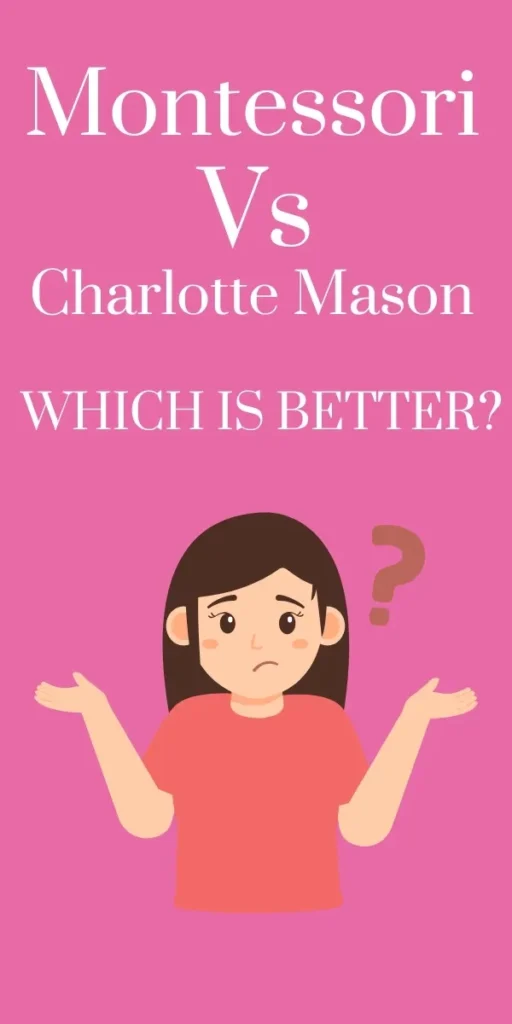Montessori Vs Charlotte Mason: For parents seeking an alternative to traditional education, the paths of Montessori and Charlotte Mason often ignite curiosity. Both hold strong philosophies and inspire passionate communities, but the differences can leave many wondering: Which approach is right for my child?
This article delves into the core principles of Montessori and Charlotte Mason, exploring their similarities, distinctions, and potential benefits for your little learner.
Ultimately, the answer lies in understanding your unique values and child’s needs.
Montessori Vs Charlotte Mason, Which Is Better? – A Quick Answer
Determining which educational approach, Charlotte Mason or Montessori, is “better” ultimately depends on personal preferences, educational goals, and the context in which the methods are applied.
Charlotte Mason offers a more structured, teacher-guided approach, whereas Montessori emphasizes child-led learning and independence.
Parents and educators must consider these aspects when choosing between the two methods, keeping in mind that neither is inherently superior—both provide valuable educational opportunities for children.
1. Foundations: Philosophical Pillars of Montessori and Mason
Maria Montessori, an Italian physician and educator, observed children in specially designed environments. Her philosophy emphasizes respect for individual development, the prepared environment, and self-directed learning. Children freely explore materials, guided by trained teachers, fostering independence, critical thinking, and problem-solving skills.
Charlotte Mason, an English educator and writer, advocated for a “living education” centered around great books, nature study, and handicrafts. Children engage with rich literature, explore the natural world, and learn through hands-on activities, cultivating curiosity, a love of learning, and a connection to the world around them.
While both philosophies share a focus on:
- Holistic development: Nurturing the intellectual, emotional, social, and physical aspects of the child.
- Intrinsic motivation: Fostering a love of learning and a desire to explore independently.
- Respect for children: Recognizing their unique identities and potential.
Key differences emerge in their approaches:
| Feature | Montessori | Charlotte Mason |
|---|---|---|
| Learning style | Self-directed, hands-on exploration with specialized materials | Literature-based, nature study, and hands-on activities |
| Role of teacher | Guide and facilitator, observing and intervening as needed | Curator of experiences, introducing great books and facilitating exploration |
| Curriculum | Sequenced and individualized based on developmental stages | Open-ended and adaptable, centered around classic literature and nature |
| Assessment | Observation-based, focused on individual progress | Informal, evaluating understanding and engagement |
2. Exploring Similarities: Shared Values in Action
Beyond their philosophical foundations, Montessori and Charlotte Mason share common ground in several key areas:
- Respect for individual learning: Both approaches place the child at the center of the learning process, tailoring experiences to their interests and pace.
- Emphasis on hands-on learning: Children actively engage with materials, nature, and activities, solidifying understanding and fostering curiosity.
- Nurturing a love of learning: Both methods aim to spark a lifelong passion for knowledge and discovery, making learning an enjoyable journey.
- Importance of community: Both environments emphasize collaboration and respect for others, fostering social and emotional development.
3. Choosing the Right Path: Aligning Values with Your Child’s Needs
Montessori Vs Charlotte Mason: A Comparison Chart
| Feature | Montessori | Charlotte Mason |
|---|---|---|
| Philosophical foundation | Child-centered, emphasis on natural development through self-directed learning | Teacher-directed, emphasis on cultivating character and love of learning through rich experiences |
| Role of the teacher | Guide and facilitator, preparing the environment and presenting lessons | Narrator and curator, introducing children to great ideas through high-quality literature and experiences |
| Curriculum | Open-ended, self-paced, based on individual needs and interests | Fixed, but flexible, based on a classical, literature-rich curriculum |
| Materials | Specialized, self-correcting, hands-on materials | Wide variety of resources, including living books, nature, toys, art supplies |
| Assessment | Observation and documentation of individual progress | Narration and discussion, based on student comprehension and engagement |
| Emphasis | Practical work, sensory exploration, independence | Character development, critical thinking, imagination, curiosity |
| Classroom environment | Calm, orderly, prepared specifically for different learning activities | Home-like, filled with beautiful books, natural materials, and opportunities for exploration |
| Discipline | Natural consequences, self-directed problem-solving | Gentle guidance, emphasis on good habits and manners |
| Suitability | Children who thrive on hands-on learning, self-directed exploration | Children who enjoy stories, discussion, and exploration of ideas |
There’s no single “better” approach; the most suitable choice depends on your family’s values and your child’s individual needs. Consider these factors:
- Learning style: Does your child thrive with hands-on materials or prefer literature-based exploration?
- Temperament: Does your child enjoy structured activities or benefit from more open-ended exploration?
- Family values: Do you prioritize self-directed learning or a curriculum guided by classic literature and nature study?
- Availability: Research schools and programs in your area to see which methods are offered.
Remember, both Montessori and Charlotte Mason offer valuable approaches to nurturing young minds. By understanding their core principles and considering your child’s needs, you can navigate the educational landscape with confidence, choosing the path that best prepares them for a journey of lifelong learning and self-discovery.

4. Beyond the Choice: Embracing the Best of Both Worlds
While opting for one approach, you can incorporate elements of the other to enrich your child’s learning experience. Here are some suggestions:
- Montessori families: Introduce classic literature and incorporate nature walks or gardening activities.
- Charlotte Mason families: Utilize hands-on materials at home or encourage open-ended exploration with found objects.
Ultimately, the goal is to foster a love of learning, independence, and curiosity within your child. By understanding the essence of both Montessori and Charlotte Mason, you can create a nurturing environment that supports their unique journey towards becoming lifelong learners and responsible citizens.